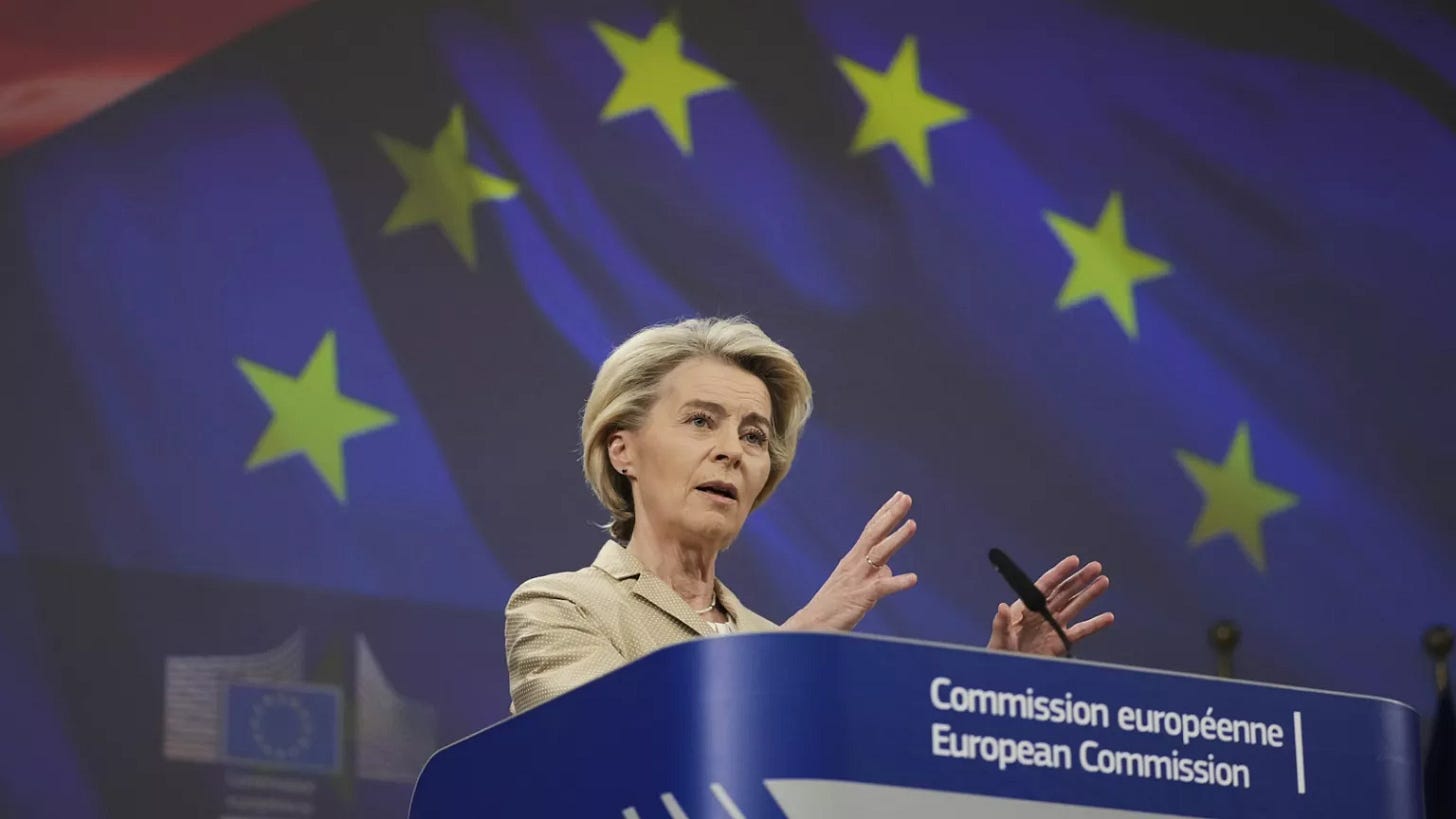Europe’s Russia Sanctions Arsenal Nears Exhaustion
EU struggles to find new ways to escalate pressure on Putin’s regime
Welcome to World Briefing, coming to you today from Thailand. If you find value in what you’re reading, consider upgrading to a paid subscription. Your support fuels my mission to deliver sharp, independent reporting and analysis—and gives you access to exclusive content you won’t find anywhere else.
Work is already under way on another sanctions package which European leaders say will be "massive” but some analysts warn that the EU has already played its best sanctions cards and doesn't have many left, especially at a time when Washington seems reluctant to join in as it pushes peace talks between Kyiv and Moscow. "The cards that we still have to play largely include measures for which we would need the United States," Benjamin Hilgenstock, senior economist at the Kyiv-based KSE Institute, a think tank, told RFE/RL. "Specifically, this would be about removing Russian oil and gas from global markets in volume," he said, adding that counties such as India, China, and Turkey would not stop buying Russian fossil fuels without the weight of secondary US sanctions. European leaders threatened Russia with "massive" sanctions on May 10 if Moscow did not agree to a 30-day cease-fire proposed by Washington. They said they were making their demand after coordinating it with US President Donald Trump. It was meant to appear as a game-changing moment, but the apparent transatlantic concord quickly went awry. Russian President Vladimir Putin did not commit to a cease-fire during a phone call with Trump on May 19, yet Trump praised the call and did not appear ready to announce new US sanctions saying imposing them now could imperil talks and make the situation "much worse." Lithuanian Foreign Minister Kestutis Budrys said that the EU could redouble its efforts on Russia's energy exports. "We should stop the major income to Russia's budget and major income to their war machine. This is the exports of gas, oil, LNG. We have to stop those," he said. But in practice, countries such as Spain, the Netherlands, and Belgium are actually importing more LNG, or liquified natural gas, now than they were a year ago.
An unidentified gunman or gunmen shot and killed former Ukrainian politician Andriy Portnov on Wednesday morning outside a school in a wealthy suburb of Madrid, a source close to the police investigation said. Police received a call about the shooting of a Ukranian citizen at 9.15 a.m. (0715 GMT) local time outside the elite American School of Madrid, located in Pozuelo de Alarcon, Madrid police told Reuters, without identifying the victim. Portnov was a senior aide to Ukraine's former President Viktor Yanukovich who was ousted in the 2014 Euromaidan revolution. Since the Russian invasion of Ukraine in February 2022, there have been several crimes involving high-profile Russian and Ukrainians in Spain, which has significant expatriate populations from both countries. In November and December 2022, six letter bombs were sent to high profile targets around Spain, including to Prime Minister Pedro Sanchez, the Ukrainian Embassy in Madrid, government offices, a European Union satellite company and the U.S. Embassy. A 76-year-old retired Spanish civil servant whose social media searches suggested sympathy for Russia was jailed for the offences - Reuters
Israeli forces continue bombarding Gaza, killing at least 42 people since dawn, dismissing criticism from the UK and the EU over the “monstrous” war in the enclave. Authorities in Gaza say Israel’s “starvation policy” has killed at least 326 Palestinians since March 2, as the UN warns that 14,000 babies are at risk of dying within 48 hours. The UN also says no aid has been distributed in Gaza because of Israeli restrictions despite a handful of aid trucks entering the territory. “We need to flood the Gaza Strip with humanitarian aid,” the UN’s undersecretary-general for humanitarian affairs said, describing the situation as “chilling”. All food, medicine and other life-saving aid had been blocked by Israel from entering Gaza beginning on March 2. As of Monday, a trickle of aid was authorised to enter for the first time since then but was not immediately distributed. Addressing the European Humanitarian Forum in Brussels on Tuesday, Philippe Lazzarini, the head of the UN agency for Palestinian refugees (UNRWA), said relief organisations have run out of words to describe the horrors unfolding in Gaza at Israel’s hands. “But the worst in all this is that we are confronted with a situation: If there is political will, the war can stop. The siege being imposed on Gaza can be lifted,” Lazzarini said - Al Jazeera
Israel has said it rejects a decision by the European Union to review the bloc's wide-ranging trade and cooperation pact with the country over its intensified offensive in Gaza. The EU's foreign policy chief Kaja Kallas stated on Tuesday that the bloc would examine if Israel has violated its human rights obligations under Article 2 of the EU-Israel Association Agreement, which defines the trading and diplomatic relations between both sides. In a statement shared on X late on Tuesday, Israeli foreign ministry spokesperson Oren Marmorstein dismissed Kallas' announcement. "We completely reject the direction taken in the statement, which reflects a total misunderstanding of the complex reality Israel is facing," Marmorstein wrote on X. - Euronews
For years, a New York Times investigation found, Russia used Brazil as a launchpad for its most elite intelligence officers, known as illegals. In an audacious and far-reaching operation, the spies shed their Russian pasts. They started businesses, made friends and had love affairs — events that, over many years, became the building blocks of entirely new identities. Major Russian spy operations have been uncovered in the past, including in the United States in 2010. This was different. The goal was not to spy on Brazil, but to become Brazilian. Once cloaked in credible back stories, they would set off for the United States, Europe or the Middle East and begin working in earnest. The Russians essentially turned Brazil into an assembly line for deep-cover operatives like Mr. Shmyrev. One started a jewelry business. Another was a blond, blue-eyed model. A third was admitted into an American university. There was a Brazilian researcher who landed work in Norway, and a married couple who eventually went to Portugal. Read more here how it all came crashing down.
A federal judge ruled late Tuesday that U.S. officials must retain custody and control of migrants apparently removed to South Sudan in case he orders their removals were unlawful. U.S. District Judge Brian E. Murphy in Massachusetts issued the ruling after an emergency hearing, after attorneys for immigrants said the Trump administration appears to have begun deporting people from Myanmar and Vietnam to South Sudan — despite a court order restricting removals to other countries. Murphy said the government must “maintain custody and control of class members currently being removed to South Sudan or to any other third country, to ensure the practical feasibility of return if the Court finds that such removals were unlawful.” While Murphy left the details to the government’s discretion, he said he expects the migrants “will be treated humanely.” Attorneys for the migrants told the judge that immigration authorities may have sent up to a dozen people from several countries to Africa, which they argue violates a court order saying people must get a “meaningful opportunity” to argue that sending them to a country outside their homeland would threaten their safety. The apparent removal of one man from Myanmar was confirmed in an email from an immigration official in Texas, according to court documents. He was informed only in English, a language he does not speak well, and his attorneys learned of the plan hours before his deportation flight, they said. A woman also reported that her husband from Vietnam and up to 10 other people were flown to Africa Tuesday morning, attorneys from the National Immigration Litigation Alliance wrote - AP
US President Donald Trump's real estate company is seeking to build a tower in Ho Chi Minh City, Vietnamese officials said on Tuesday, with his son due to scout locations this week. According to AFP, authorities in Vietnam's southern business hub said in a statement they met a representative of the Trump Organisation and its local partner, the Kinhbac City Development Corporation (KBC). The statement said authorities had already conducted a field survey of two potential locations in the eastern part of the city on Monday and are scheduled to meet leaders of the Trump Organisation on Thursday. The company, which builds luxury developments around the world, has come under scrutiny, with critics accusing Trump of leveraging his political position for personal financial gain. According to Nikkei Asia, Trump's son Eric will visit Vietnam starting May 22 to scout a location for a potential Trump Tower. Eric Trump, executive vice president of The Trump Organization, is likely to meet with Ho Chi Minh City leaders for dinner on Thursday, according to the document from the Ho Chi Minh City Foreign Affairs Department.
The U.S. president’s eldest son Donald Trump Jr. said Wednesday that he wouldn’t rule out a future run for the White House. “Maybe one day … that calling is there,” Trump Jr. said at the Qatar Economic Forum in Doha. “I think my father has truly changed the Republican Party.” Trump Jr. is considered one of the most prominent figures in the MAGA movement and is seen as a potential successor to his father’s political legacy, if not the top job. He currently serves as executive vice president of the Trump Organization, but also helps shape his father’s second administration, ensuring that loyalists and ideological true believers populate the executive branch, while serving as a key Trumpian attack dog on social media - Politico
Last week, Ukrainian President Volodymyr Zelenskyy invited Russian President Vladimir Putin to join him for face-to-face peace talks in Turkey. The Russian leader didn't show. But delegations from both countries did hold their first direct talks in three years, negotiating a prisoner-of-war exchange. Michael Bociurkiw, a global affairs analyst and senior fellow at the Atlantic Council, joins Piya Chattopadhyay to make sense of these latest efforts at bringing a diplomatic end to the years-long conflict. Listen to the full interview here.







